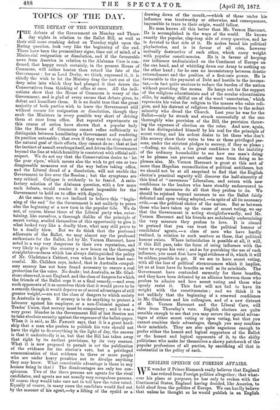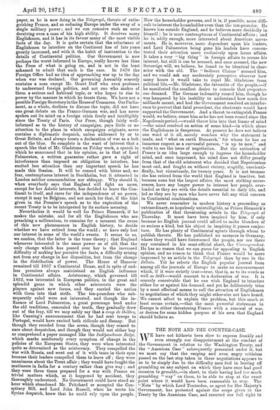ENGLISH OPINION ON FOREIGN AFFAIRS.
WE wonder if Prince Bismarck really believes that England has retired from Foreign politics altogether; that what- ever his plans or purposes, he has only to reckon with the Continental States, England having decided, like America, to hold aloof from the politics of Europe. We can hardly believe that unless he thought so he would publish in an English paper, as he is now doing in the Telegraph, threats of extin- guishing France, and so reducing Europe under the sway of a single military power ; and we can conceive such an error deceiving even a man of his high ability. It deceives many Englishmen, and it has in its favour many of the most visible facts of the day. It is quite certain that the reluctance of Englishmen to interfere on the Continent has of late years greatly increased, and with it the habit of inattention to the details of Continental politics. Our Government is now perhaps the worst informed in Europe, really knows less than the Press of what is going on, and is not in the least ashamed to admit that such is the case. In 1870 the Foreign Office had no idea of approaching war up to the day when war was declared. Our governing Assembly scarcely contains a man except Mr. Grant Duff who even professes to understand foreign politics, and not one who makes of them a serious and habitual topic, or who hopes to rise to power by the manner in which he treats them. We have not a possible Foreign Secretary in the House of Commons. Our Parlia- ment, as a whole, declines to discuss the topic, did not have one great debate on the Franco-German war, and has never spoken out its mind on a foreign crisis freely and intelligibly since the Treaty of Paris. Our Press, though fairly well- informed as to the history of campaigns, pays little or no attention to the plans in which campaigns originate, never contains a diplomatic despatch, unless addressed by or to Great Britain, and always treats a declaration of war as a bolt out of the blue. So complete is the want of interest that a speech like that of Mr. Gladstone on Friday week, a speech in which he announced that in his opinion, as in that of Lord Palmerston, a written guarantee rather gave a right of interference than imposed an obligation to interfere, has excited less attention than any important speech he has made this Session. It will be conned with bitter and, we fear, contemptuous interest in Stockholm, but it attracted in London neither commendation nor obloquy. Why should it, when everybody says that England will fight no more, except for her Asiatic interests, has decided to leave the Con- tinent to itself, and cares for the independence of no power, except it may be Belgium, and not much for that, if the hint given in the Premier's speech as to the expiration of the recent Treaty is to be interpreted by its surface meaning.
Nevertheless it would be well for Prince Bismarck, if he makes the mistake, and for all the Englishmen who are preaching a millennium, to examine for a moment the cause of this new phenomenon in English history, to decide whether we have retired from the world ; or have only lost our interest in some of the world's events. It seems to us, we confess, that the latter is the truer theory ; that England whenever interested is the same power as of old, that the only change which has passed over her is the increased difficulty of making her perceive the facts, a difficulty arising not from any change in her disposition, but from the change
in the distribution of power. The House of Hanover remained till 1837 a Continental House, and in spite of end- less promises always maintained an English influence in Continental affairs. Aristocracy, which governed till 1832, was interested in European politics, in the great and splendid game in which other aristocrats were the players against new forces, and they carried the nation with them into that strife. The ten-pounders who sub- sequently ruled were not interested, and though the in- fluence of Lord Palmerston, a great personage bred under the old traditions, concealed the truth, they gradually drew out of the fray, till we may safely say that a coup de than, like Canning's announcement that he had sent troops to Portugal, would have excited both ridicule and dismay. But though they receded from the arena, though they ceased to care about despatches, and though they would not either buy or comprehend a paper managed like the Inde'pendance Belge, which marks assiduously every symptom of change in the policies of the European States, they were when interested quite as determined as the aristocracy. They compelled the war with Russia, and went out of it with tears in their eyes because their leaders compelled them to leave off ; they were unanimous about the Trent affair ; they would have fought the mutineers in India for a century rather than give way ; and they were three times prepared for a war with France on trivial matters which, as it happened by accident, they thoroughly understood. No Government could have stood an hour which abandoned Mr. Pritchard or accepted the Con- spiracy Bill, and Lord John Russell, when he wrote his Syrian despatch, knew that he could rely upon the people.
Now the householder governs, and it is, if possible, more diffi- cult to interest the householder even than the ten-pounder. He knows less outside England, and he believes more decidedly in himself ; he is more contemptuous of Continental affairs ; and he is, oddly enough, more interested about American move- ments. He is, moreover, more dependent upon his leaders,
and Lord Palmerston being gone his leaders have concen- trated their attention more exclusively upon home affairs. It takes a very "big thing " in foreign affairs to arouse his interest, but still it can be aroused, and once aroused, the new Sovereign will, we believe, be found to be identical in char- acter with the old. The " Indirect Claims " aroused him, and we would ask any moderately perceptive observer how many hours it would take to expel Mr. Gladstone from political life,—Mr. Gladstone, the favourite of the people,—if he manifested the smallest desire to concede that preposter- ous demand. The German indemnity roused him, though he was hampered by his inability to understand how much five milliards meant, and had the Government resolved on interfer- ence to prevent that fatal precedent, the electorate would have supported the Government. And a threat to extinguish France would, we believe, rouse him as he has not been roused since the Napoleonic period,—would throw him into that frame of mind —the mind resolved on action of some kind—in which alone the Englishman is dangerous. At present he does not believe one word of it all, merely wonders why the statement is made, and " what on earth Bismarck," for whom he has an immense respect as a successful person, " is up to now," and waits to see the issue of negotiation. But the extinction of France is an idea large enough to impress the householder mind, and once impressed, his mind does not differ greatly from that of the old aristocrat who decided that Napoleonism must end, and fought on without victory, stupidly, unscienti- fically, but victoriously, for twenty years. It is not because she has retired from the world that England is inactive, but because none but the largest affairs, the most striking occur- rences, have any longer power to interest her people, over- loaded as they are with the details essential to daily life, and led as they are by men who have never felt any vital concern in Continental combinations.
We never remember in modern history a proceeding so extraordinary, so hopelessly unintelligible, as Prince Bismarck's publication of that threatening article in the Telegraph of Thursday. It must have been inspired by him, if only because no English journal could afford to make blunders of so serious a kind, but his object in inspiring it passes conjec- ture. He has plenty of Continental agents through whom to publish threats. He has published no menaces in Germany, where they would have forewarned the people, nor are there any contained in his semi-official sheet, the Correspopulent. He has no reason that we can guess for appealing to English opinion, and no reason to think that France would be more impressed by an article in the Telegraph than by one in the Debate. Yet he selects the English popular journal from among all the journals of Europe to make an announcement which, if it were strictly true—true, that is, as to its words as well as drift—would amount to a declaration of war. It is scarcely conceivable that he can wish England to interfere either for or against his demand, and yet he deliberately tries by a most effectual means to call the attention of Englishmen to negotiations of which they might otherwise not have heard. We cannot affect to explain the problem, but this much at least seems certain,—that the most powerful statesman in Europe is either threatening France with a renewal of war, or desires for some hidden purpose of his own that England should believe so.



































 Previous page
Previous page